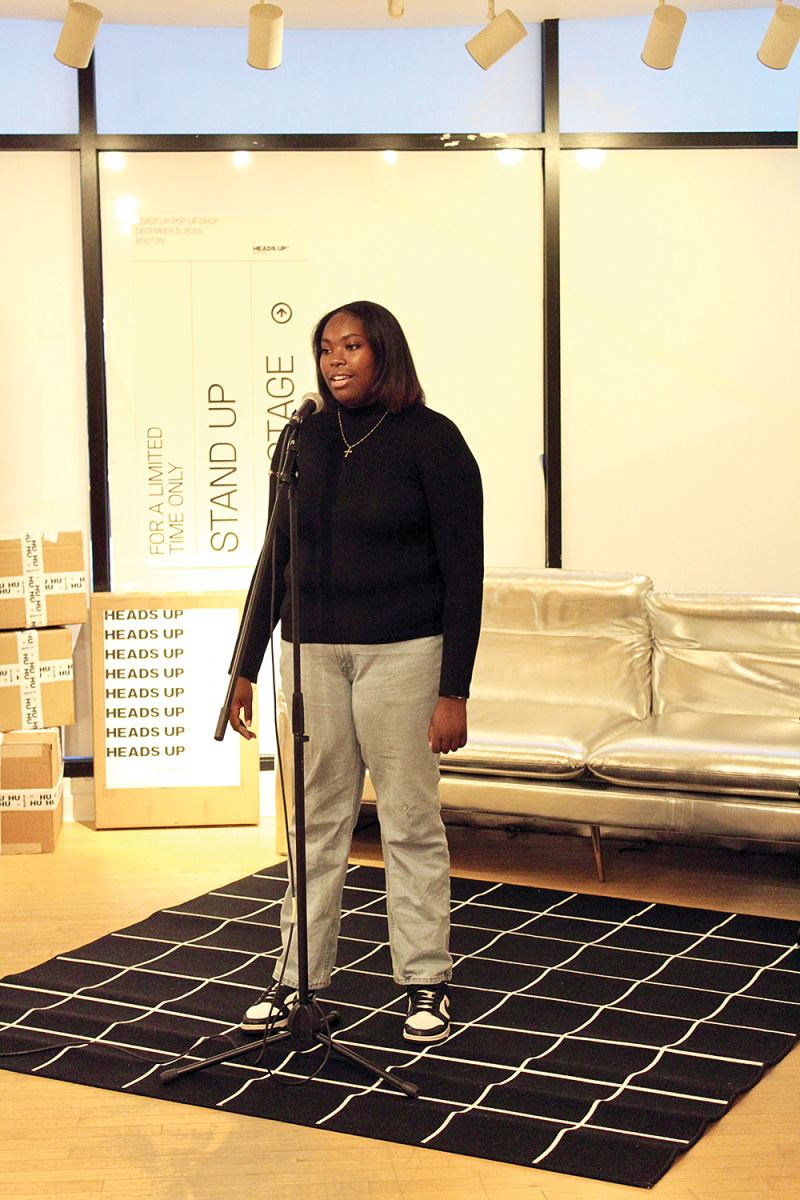December 24, 2024

Teens gathered around to sign the Heads Up pledge promising to take care of themselves, others, and everyone. Cassidy McNeeley photos
On Dec. 3, Mayor Wu and the Boston Public Health Commission (BPHC) announced the launch of “Heads Up, Boston,” a new campaign created to destigmatize discussion of mental health issues among Boston youth.
Led by the BPHC’s Center for Behavioral Health and Wellness, the program seeks to encourage teens to speak up and discuss their concerns with each other.
“This campaign was backed up by the Health of Boston Mental Health Report that came out,” said Samara Grossman, director of the center. “Before that, even, we saw there are intense mental health needs rising for youth as well as everyone in Boston.”
She added, “For youth in particular, there has been a heightened increase of persistent sadness, anxiety, suicidal thinking, and a feeling of overwhelming stress in general. From that, we understood that something needs to be done.”
That something is the campaign that officially launched on Dec. 5 at a one-day “pop-up” for high school students between 14 and 19 years old who gathered near Downtown Crossing. There, they received free merch, enjoyed musical performances, and were told about various mental health resources.
“I want [the teens] to take away a feeling of being supported and seen and actually having fun,” said Grossman. “What we want them to do is feel even freer to talk about their mental health with each other explicitly, and to be able to give each other support and resources.”
Throughout the event, some 200 teens entered the shop and pledged to take care of themselves, others, and everyone. Thanks to Argus, a Boston-based marketing agency, the storefront was filled with apparel, accessories, and messages that further emphasized the campaign’s goal of inspiring youth to have those tough conversations.
Not only did the teens leave with t-shirts, socks, sweatshirts, bracelets, tote bags, and note pads, but they also took with them the encouragement to discuss how they are doing and what they are feeling.
“I would be hopeful that teens got to take away that you can be who you are in whatever shape, color, form that is and there’s a space for you. The city is thinking about you, we want to hear your voice,” said Dr. Kevin Simon, chief Behavioral Health Officer for BPHC.
Both Simon and Grossman feel that this generation can change how mental health is discussed and addressed.
“I’m excited about seeing how much better young people are at expressing themselves as it pertains to mental and emotional wellness than older populations,” Simon told The Reporter. “I’m hopeful that as they transition into post-high school years, they recognize they are in charge and empowered by speaking and using their voice.”

19-year-old Taylah Peterson, a youth choir member at the Hamilton-Garrett Center for Music and Arts was the first of a series of performers to sing at the pop-up event.
Taylah Peterson, a 19-year-old youth choir member at the Hamilton-Garrett Center for Music and Arts, took part in the conversations. “I’m very in touch with my peers and I think mental health is a very big issue, especially when it comes to people my age,” said Peterson, who lives in Dorchester. “Sometimes they feel like they don’t have the resources, or they feel alone. I came to this event to perform and to let everybody know that they’re not alone.”
As Peterson’s voice echoed through the packed storefront, 15-year-old Jormanny felt inspired. “I feel like the event is driving a positive impact, especially with the resources that they have. If you spread those resources, it’s like a domino effect.”
Those same resources can be found online at headsupboston.org, which also features a section for parents and caregivers on how to support their teens.
“Mental health is not just one thing,” said Simon. “The environment I’m from, the neighborhood I’m from, the resources, financial or otherwise that my family does or does not have, the food, the educational environment, the literal access to providers, be that a pediatrician or therapist, all that impacts one’s mental health.”
He explained that last March, a youth risk behavioral health survey revealed that young people of color and those in the LGBTQ+ community had even higher levels of anxiousness and negative thoughts. The survey also suggests that these populations were the least likely to reach out for help and that they did not know where to find resources.
Simon is hopeful the pop-up shop allowed teens of color and various sexual identities to seek that help.
“We want to help everybody,” said Simon. “Whether you are in the South End, Roslindale, Dorchester, Hyde Park, or Eastie, we want to help.”


